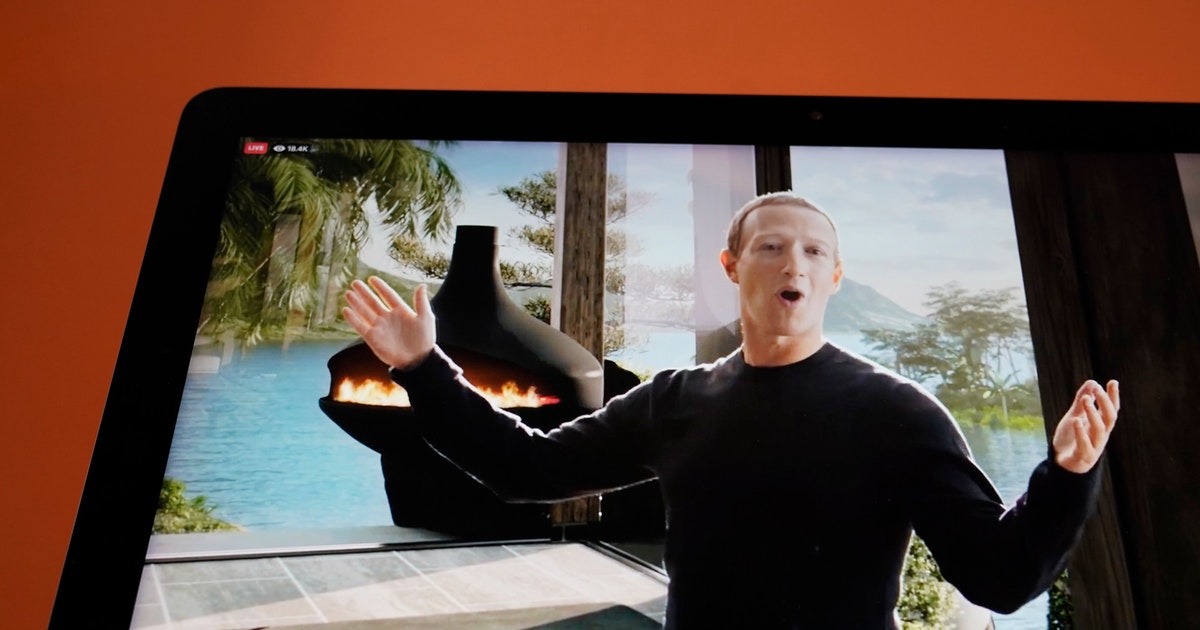Berlin – A Facebook group is giving itself a new name. The Meta umbrella brand will be available in the future via services like Facebook or Instagram, Facebook founder Mark Zuckerberg announced Thursday. With the new name, Zuckerberg wants to direct the focus to the new virtual world “Metaverse”, in which he sees the future of digital communications as well as the future of his company.
He also wants to use it to lead the group more aggressively outside the shadow of Facebook’s original and most important platform to date. In addition to Instagram, the company’s portfolio also includes WhatsApp and Messenger applications. These individual services will retain their names.
“Today we are seen as a social media company, but at our core we are a company that connects people,” Zuckerberg said. The Facebook name can no longer reflect the full range of products the group offers.
The physical and digital worlds united in the ‘Metaverse’
According to the 37-year-old Facebook founder’s presentation, the physical and digital worlds must come together in the “Metaverse”. On the other hand, Zuckerberg relies on virtual reality (VR), where users can immerse themselves in digital worlds with special glasses on their heads. The Facebook group bought VR Oculus, a leading maker of glasses for virtual reality viewing, seven years ago. The Oculus brand name is now being phased out. The current VR glasses will be called the Meta Quest instead of the Oculus Quest.
The Facebook founder also sees so-called augmented reality (AR) as a “metaverse” component, in which digital content is projected onto displays or with the help of viewing glasses to the viewer in the real environment.
Zuckerberg: the successor to “Metaverse” for the mobile Internet
Zuckerberg confirmed: “We believe the ‘Metaverse’ will be the successor to the mobile internet.” In the future, everything related to the “Metaverse” will take precedence over Facebook. The group is expanding its virtual “Metaverse” worlds under the name “Horizon”.
At the in-house Connect developer conference, Zuckerberg provided the most detailed description of his “Metaverse” concept to date. It will be a virtual world in which you can immerse yourself in more depth, right down to the facial expressions of the people around you. “Instead of looking at a screen, you’d be in the middle of these experiences.”
He stressed that a sense of presence is the defining characteristic of the “Metaverse”. “If I send my parents a video of my children, they will feel that they are with us.”
“Horizon Home” for Oculus users
With “Horizon Home,” the Facebook founder announced a new “more social” home for Oculus users. However, the area looks very similar to the starting area that VR goggle users find today. What’s new is that users can use virtual rooms and objects across individual game or event boundaries.
The Facebook founder said that it will be possible to scan physical objects so that they are also present in the “Metaverse”. At the same time, they will be able to display them as 3D images anywhere in the real world. Zuckerberg emphasized that many of them will be part of everyday life in the next five to ten years.
Zuckerberg has already said that his company hopes to have a billion users in the “Metaverse” by 2030 — and several hundred million dollars in business. This year alone, Facebook is spending ten billion dollars in development work.
Increase Facebook share
Zuckerberg’s vision was well received by the stock exchange. After the presentation, Facebook’s share exited circulation with an increase of about 1.5 percent. The stock exchange’s abbreviation should change from “FB” to “MVRS” on December 1, based on the “Metaverse”.
Facebook also emphasized that the announcement did not change anything in the way the company handles data. The group has come under heavy pressure in the past few weeks from internal documents released by a former employee. Frances Haugen appears as a whistleblower and accuses Facebook of putting profits above the welfare of its users.
Facebook is not the first company in Silicon Valley to change its company name to indicate that the direction of the company has broadened. In 2015, for example, Google put a new holding company called Alphabet on the block. The internet company wanted to point out that it not only runs a search engine and cloud business, but also has ambitions for self-driving cars, health solutions and other high-tech fields. However, Google still generates nearly all of Alphabet’s revenue, and the bottom line is that other companies are only posting losses. The head of Google, Sundar Pichai, is now also at the top of the Alphabet list.


“Certified gamer. Problem solver. Internet enthusiast. Twitter scholar. Infuriatingly humble alcohol geek. Tv guru.”





